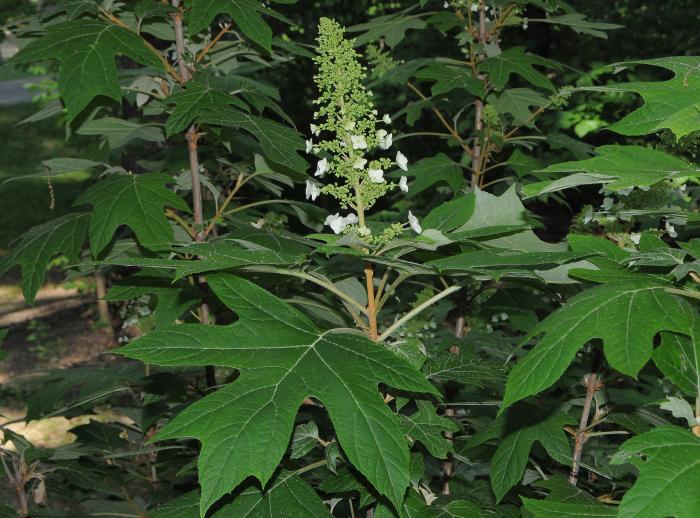Hydrangea quercifolia W. Bartram
Oakleaf Hydrangea

Native
CC = n/a
CW =
MOC = 0
© SRTurner
Hydrangea quercifolia W. BartramOakleaf Hydrangea | |
 |
Native CC = n/a CW = MOC = 0 |
© SRTurner |
|
Family - Hydrangeaceae Habit - Shrub. Stems - To 2.5m tall, multiple from base, branching, woody.
Leaves - Opposite, 5-7 lobed, petiolate, margins serrate, tomentose below, sparsely hairy to glabrous above, to +12cm broad, +15cm long.
Inflorescence - Dense, terminal panicle to +30cm long. Peduncle and axis puberulent to tomentose.
Flowers - Outer flowers of inflorescence with 4 white, petaloid sepals (petals absent), sterile, to +2.5cm broad. Inner flowers small, with greenish sepals, fertile. Stamens 8-10, spreading. Filaments greenish-white, to 8mm long, glabrous. Anthers biglobose, whitish, 1.2mm broad.
Fruits - Capsules. Flowering - June - August. Habitat - Cultivated. Origin - Native to the southeastern U.S. Lookalikes - Broadly, other members of the Hydrangea genus. Other info. - This species is unmistakable while flowering because of the large, showy panicles it produces. These are usually elongated and conical rather than the more hemispherical inflorescences produced by other cultivated Hydrangea species. It prefers well drained yet cool soil. The plant does not (yet) occur naturally in Missouri, but rather in a relatively tightly clustered distribution contained mostly within Mississippi and Alabama. Photographs taken at the Kansas City Zoo, 7-9-00 (DETenaglia); also at Kirwood Park, St. Louis County, MO, 5-18-2017 and 6-5-2019, and the St. Louis Zoo, St. Louis County, MO, 6-11-2019 (SRTurner). |